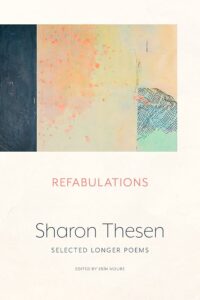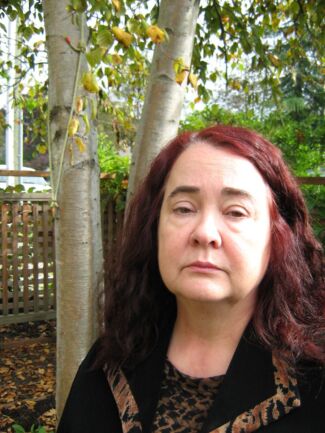A ‘record of the poet’s life’
Refabulations: Selected Longer Poems
by Sharon Thesen
Vancouver: Talonbooks, 2023
$24.94 / 9781772015102
Reviewed by Cathy Ford
*

On those occasions in life, when it is, despite inclination or intention, a day disturbed, full of anxieties, turmoil, the horrors of several wars at once on this oh so small earth, it is sheer joy to encounter a very fine book of poems indeed. A balm for the soul, a summons to the most humane instincts. Refabulations is a book carefully selected, brilliant, coherent, and precisely organized; not just a chronology of expression or lifeworks publication, but maturity of sensibility, resilience, a regard for posterity. Suffice to say, when a book of selected longer poems, or series works, restores one’s faith as a reader of poetry in general, it’s undeniably a very very fine book.
After a time, one reads to one’s own taste, perhaps. Even if always seeking the new, reading or rereading a poet whose work one already prefers, in the sheer strength of a fresh gathering together of years of poems masterfully crafted, a selected collection creates a new resonance, constructs a shimmer of delight. The poems in this collection, in the female voice, are not just sympathetic in content, but immaculate in relative form. Thesen is exemplary in levering control of the “story” and “shape” of each poem.
Sharon Thesen’s poetry has focused from her first publications on a singularly specific woman’s point of view—the friend, daughter, lover, wife, mother’s life—on a kind of care-giving of the qualities of humanity you only capture through life and death experience and challenges to empathy, and especially, the struggle for grace, whether female or male. Not all writers, however, are so at ease with making apparent, without posturing or fictionating, what matters.
These are stories told, poems written, not so much as poetic narration, but “a book of common prayers.” “These days,” in Thesen’s poems, present a recognizable life trajectory through love, marriage, education, aging, loss. They are all chimerical, those occasions, including summer parties, when the tapestry of life’s messaging comes clear. With verve and whimsy in each perceived likeness, the common touch of experience this writer shares, the concerns and colourings of this collection of poems, draw one in.
The opening epigraph for this book, from Journey to Mount Tamalpais, by Etel Adnan, tells the reader everything except the experience of the poetry itself; the organizing principles, contextual, if not chronological, envisioned in a loving concentration of language, at ease in expert hands. “Resuscitate the form out of the line… exorcise the shadows” gives this book a through guideline, consistent, compatible with each piece selected for inclusion, as representative of this poet’s visceral, sensual, detailed approach to writing.
As a reader, I found myself grateful, challenged, driven to the reference wall or well, transcending the particular, sometimes in vocabulary, sometimes in other literatures. The physical laws of life, like the magic of acrobatics, sans simile, metaphor, are leapt over; instead, a kind of confident actualized image-making, and progressive thinking, moves each piece. The poet here is always the provocateur, questioning perception, its depths and shallows, its presumptions, its paintwork.
In this volume, the passion of the long poem reigns, the ongoing possession of the serial poem’s point of view become the oeuvre, or lifework; a response in poetics, through years of Thesen’s writing, continuous, its gaze unique, shared. The everyday of the every day moves through these poems, vivid, seen from beginning to end with the sharpest clarity of lens; the poet writing in the ecologist voice of metapoetics, the poetry life and the life of poetry hand in hand, particularized.
Some of the poems in Refabulations are accompanied by memory portraits of old friends, living ghosts of art, literature, friendship. This life archiving of the present of the poem, all observation, impulse, memory, as if now, makes for a powerful collection. Words, ideas, made fresh; worthy of close consideration and praise.
The dissolution of set ideas, or notions of what poetry is made of or inspired by, is examined in these poems. In a continuous narrative of life observations, experience, planting and replanting as the seasons of living and ending, these poems create a record of the poet’s life. In unraveling acute bright threads of engagement, heightened awareness, interrogation, the poems dwell on the specificities of each day. Each poem presents itself as present-time, and a kind of refracted story of the wisdoming of the female body. In its captivating femininity, aging, tenderness with its eroticism, costuming, care, the shoes, the hair, the entrance and exit of any appearance at the party, sensibility of female body awareness is clearly present.

In the conceptual weaving of implicit feminism, to care so much, be so clear, to be adamant about the balanced measure of dedication to one’s art, craft, commitment, is the hot intelligence of this writer. Lake Country resident Thesen (The Receiver) presents in her work the vision of an inamorata in creating or discovering new poetry, meeting new ideas head on, skating on the edge, but remaining avowedly accessible; not pretentious but profound. The poems linked together in this collection, nuanced as any fabled account of Cinderella, or the high wire act of living in full, include epigraphs of the beloved. In friendships as immediate and exact as the last moments with one another, in life, death, marriage, elegiac praise, end of—Thesen excels.
The brilliant opening of many kinds of love story, backgrounding numerous poems in this book, are a fire burning, proofing of the individual poems. In all the different ways of saying, shaping, making–how the poet explores and expresses love is delineated. The poet’s queries about life and love are applied to a better ego-less awareness, improved relationships, with change, with where and how to live. The self-identified, erudite, virago, the virtuous smart mouth poet, gentle with humour, searing with insight, moves the reader of these poems into imaginative insight, seeing daily experiences with fresh eyes.
Thesen’s poetry “voice” presents as a determined practitioner of sheer wit, at odds sometimes with oneself, but ultimately in balance, unorthodox. This writing is generous with what’s inherited, interested in the preservation of what is shared, studied, known. Yet all experiences are continually challenged, including attempts at problem-solving, puzzling life out.
In the infusion of language and image in this book, fallen true as in a measure, precise, CBC Canada north reigns–Prince George, the Okanagan, Vancouver years. The landscape point of view in these poems is relative and according to the seasons and the earth’s axis, not magnetic as in group think or zeitgeist, but with a sense of commonality, its optimism freshened, point of view individualized. The reader finds image making. These are recorded actual images, filmic work. In these poems, not metaphor or simile, but life, as, as if, if, in it. Not a practice, that is, the poem, while liberating and startling clear, but a presentation, just standing confident, complete, inseparably itself.
As a last drift of perfume from a dying friend’s leaving the room informs one’s sense of art, visual language, Thesen creates beauty. Her work is accompanied by cherished dead souls, the tenderness of insomniac music floating the air. In not knowing an exact location but marking the effect of loss, confusion, dislocation, sleeplessness, one is falling into expert hands in these poems. When meeting a trusted companion and generous spirit, the catch just before the fall—these are the poems that resonate, that in Thesen’s portraiture, characterize Woolfian pictures in the mind.
It is possible only to quote a few lines, the ones that threw themselves like arrows into my heart, or lightning into the brain, wrenching, thought-provoking. Most deeply for me, the elegies, for beloved friends, marriage, parenting, life and death. What else is poetry for—what does it mean, do, achieve, resolve, if anything, question—like trapeze high wire acts, which taut lines reverberate and what influences open the heart?
- from “A Pair of Scissors”: “The boat of their souls gently unmoored” and “The lines scored by the penknife of regret / on the removed eroticism of her body”
- from “Six”: “it feels good / to do this & breathe / coming up / counting pebble / by pebble / my spine”
- from “Confabulations”: “five, ten, twenty / versions of a sentence / annealed to one broken one.” and “I wake up / weeping the whole grief of the world / strangling my vocabulary.”
- from: “The Good Bacteria”: “I was calling the name of my son.”
- from “Weeping Willow”: “the two of us in a kitchen / our children in the next room / playing and murmuring / — primitive philosophers / she would say / tears welling” and “Angela, I say / I can’t write love poems. / That’s all right, she says.”
- from “The Nets of Being”: “insomniacs, black circles under their eyes, / dead souls, some record playing on the Victrola, / silhouettes, flakes of poppy, tassels / softly sweeping away a dream”
Final notes, on seeking this “Refabulations” out, thanks sincerely for Erin Moure’s intensely skilled editorship, introduction, care of the afterword, all openings, not absolutes, for which thanks. Buy this book, read and reread these poems. A reminder, a deep breath, beginning.

*

Cathy Ford is a poet, fictioniste, and memoirist working predominantly on the long poem, feminist issues, life and death concerns, social justice and peace, our relationship with this beloved earth. She has published more than fifteen books, including the art of breathing underwater (Mother Tongue, 2010), and Flowers We Will Never Know The Names Of (Mother Tongue, 2014) — an abc book of the language of flowers and their transliteration, an interpretation of grief and protest, based on the Montreal Massacre. Her earlier books are published by blewointment press, Caitlin Press, Harbour Publishing, and Véhicule Press. She lives in Sidney. [Editor’s note: Cathy Ford has reviewed books by Mona Fertig, Judith Copithorne, bill bissett, Jónína Kirton, and Linda Rogers for BCR.]
*
The British Columbia Review
Interim Editors, 2023-25: Trevor Marc Hughes (non-fiction), Brett Josef Grubisic (fiction and poetry) Publisher: Richard Mackie
Formerly The Ormsby Review, The British Columbia Review is an online book review and journal service for BC writers and readers. The Advisory Board consists of Jean Barman, Wade Davis, Robin Fisher, Barry Gough, Hugh Johnston, Kathy Mezei, Patricia Roy, Maria Tippett, and Graeme Wynn. Provincial Government Patron (since September 2018): Creative BC. Honorary Patron: Yosef Wosk. Scholarly Patron: SFU Graduate Liberal Studies.
“Only connect.” – E.M. Forster
2 comments on “A ‘record of the poet’s life’”